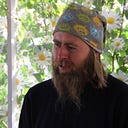A Book About the Most Advanced Russian Ecovillage’s Founder
Here is a recent book about Fedor Lazutin (1966–2015) — the founder of one of the oldest (20+ years) and one of the most advanced ecovillages and kin domain settlements in Russia [1] — ‘Kovcheg’ (website, Facebook page). Internationally he is known as one of Europe’s most successful natural beekeeper [2].


It’s written by Igor Polsky, an eco-philosopher (watch his worldview in this short cartoon ‘New History of the Earth’), a teacher, and an active member of Global Ecovillage Network Russia (an organization that was co-founded by Lazutin). Igor evaluates the rises and falls of the new village creation and the story of its founder. The book also touches on topics related to:
- natural beekeeping,
- conflicts in intentional communities (a top challenge for ecovillages),
- forest protection,
- and the ecovillage movement in Russia and in the World.
Kovcheg belongs to the ‘second wave’ (2000–2010) of the Back-to-the-land movement in post-soviet countries [3]. In that period author was very active and deep inside the movement, so his book summarizes the experience of this ‘second wave’ in general. The stories and concepts presented are also examples of what could be a ‘biocentric’ ecovillage [4]. So the ‘A man ahead of his time’ narrative pictures not only the past and the present days, but tries to set further guidelines.
I’ve been to ‘Kovcheg’ two times (in 2018 and 2020)— about 6 weeks in total. It was an amazing experience — volunteering, researching, being a participant in an ecological building seminar, and doing consulting. Now I have a few good friends there. Compared to all other ‘back-to-the-land’ initiatives I’ve been, it was really obvious to me how sound ‘Kovcheg’ is, how long-term and smart it was created just from the beginning, and what the potential was put there for further development by its firstcomers led by Lazutin’s vision and execution.

Nowadays Kovcheg is:
- 121 hectares in total
- with 81 hectares of kin domains
- populated by 200 people.
- seed-saving and ecosystem restoration initiatives
- common sawmill, carpentry and car workshops
- central water conduit and a common sauna
- joint purchase shop
- local theatre ‘Malakhit’
- It’s 140 km away from Moscow.
Beyond cooperative, cultural, and agricultural advances one of the biggest community achievements, that I’ve discovered, is the full 11-year school, and a new generation that has grown there and that is really connected to both worlds — modern civilization and its countryside alternative. The book is also a great base for this generation (kind of a ‘kin book’), so they can better understand some of their origins and the context they were growing up in.
Here is what Nikita Gabov, now a master's student for international affairs, who has grown in Kovcheg, says about the book.
Speaking about the contents of the book with different people, I noticed that many of them find in it meanings close to themselves, which at first glance do not have a relationship with each other. So, for a feminist, this book is about women’s leadership, for dreamers it is about an important kind of ideology, for practitioners it is an instruction for use. Probably, this is what distinguishes really high-quality material: it makes you think — but we think differently, therefore the conclusions are different.
If to describe the book in one word, I would choose the word ‘quality’. I was amazed — how thoughtful the story is, how the mood of Kovcheg is conveyed, and, as people who knew Fedor say, is the spirit of Fedor himself.
I believe for any intentional community writing such a story is a crucial thing for knowing its own roots, further development, and thriving.
Other books related to the ‘Back-to-the-land’ movement in Russia can be found in [3].
- ‘Kin’s Domains as a Game-changing Narrative in Post-Soviet Countries’ in Positive Images of Future that Inspire Ecological Movements and Actions (2021)
- Keeping Bees With A Smile (2013), Fedor Lazutin
- Eco-villages, Kin’s Domains and New Farmers: 25 Years of the Modern ‘Back to the Land’ Movement in Russia/CIS (2020)
- Bio-dome. A Blueprint for a Bio-centric Ecovillage (2020), Andrew Mcmillion and Co.
